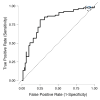Mini-ACE: Validation Study Among Older People in Long-Term Care
- PMID: 38223221
- PMCID: PMC10785962
- DOI: 10.5334/joc.330
Mini-ACE: Validation Study Among Older People in Long-Term Care
Abstract
Background: The Mini-Addenbrooke's Cognitive Examination (M-ACE) is a valid and reliable tool that accurately differentiates various types of cognitive impairment from Normal-cognition assessed in multiple settings. However, its validity among older individuals in long-term care (LTC) was not yet established. Therefore, we sought to assess the Portuguese M-ACE's validity, reliability, and accuracy in detecting cognitive impairment no-dementia (CIND) in LTC users.
Methods: A comprehensive assessment was performed on 196 LTC Portuguese users aged ≥ 60 years, among whom 71 had Normal-cognition, and 125 had CIND.
Results: The M-ACE was found to be reliable (McDonald's ω = .86, Cronbach's α = .85) and consistent over time (r = .72; ICC = .83) and between raters (k = .92). Strong correlations with related measures supported construct validity (both r = .67). The M-ACE accurately distinguished CIND from Normal-cognition with a cut-off of 17 points (AUC = 0.81, Sensitivity = 81.7%, Specificity = 74.4%).
Conclusion: Our findings suggest that the Portuguese M-ACE is a valid and reliable cognitive assessment tool for LTC users, allowing for accurate differentiation between CIND and Normal-cognition. Thus, the M-ACE's use could contribute to the early detection and intervention of cognitive disorders, especially among older adults in LTC.
Keywords: M-ACE; cognitive assessment; cognitive impairment; long-term care; older adults.
Copyright: © 2024 The Author(s).
Conflict of interest statement
The authors have no competing interests to declare.
Figures



References
-
- American Psychiatric Association. (Ed.) (2013). Diagnostic and statistical manual of mental disorders: DSM-5 (5th ed). American Psychiatric Association. DOI: 10.1176/appi.books.9780890425596 - DOI
-
- Andrade, F., Lima, J., Fidelis, K., Jerez-Roig, J., & Lima, K. (2017). Cognitive impairment and associated factors among institutionalized elderly persons in Natal, Rio Grande do Norte, Brazil. Revista Brasileira de Geriatria e Gerontologia, 20, 186–196. DOI: 10.1590/1981-22562017020.160151 - DOI
-
- Apolinario, D., Lichtenthaler, D. G., Magaldi, R. M., Soares, A. T., Busse, A. L., das Gracas Amaral, J. R., Jacob-Filho, W., & Brucki, S. M. D. (2016). Using temporal orientation, category fluency, and word recall for detecting cognitive impairment: The 10-point cognitive screener (10-CS). International Journal of Geriatric Psychiatry, 31(1), 4–12. DOI: 10.1002/gps.4282 - DOI - PubMed
-
- Aslam, R. W., Bates, V., Dundar, Y., Hounsome, J., Richardson, M., Krishan, A., Dickson, R., Boland, A., Fisher, J., Robinson, L., & Sikdar, S. (2018). A systematic review of the diagnostic accuracy of automated tests for cognitive impairment. International Journal of Geriatric Psychiatry, 33(4), 561–575. DOI: 10.1002/gps.4852 - DOI - PMC - PubMed
LinkOut - more resources
Full Text Sources
Miscellaneous

